- Home
- Craig Schaefer
The Instruments of Control (The Revanche Cycle Book 2) Page 5
The Instruments of Control (The Revanche Cycle Book 2) Read online
Page 5
It should have made her happy, but all Livia could think about were the hundreds of victims she couldn’t save.
You could have, she told herself, thinking about the forbidden book now hidden under the mattress in her tower guest room. Oh, you could have saved them all. You just didn’t.
“Miss,” piped up a voice to her left. “Miss! Hey, hello!”
She turned to see Freda, self-appointed shepherd of the Salt Alley urchins, coming her way. The freckled girl lugged two overstuffed sacks of grain in her arms, both of them looking to spill at any moment. Livia reached out without a word and scooped up one of the heavy sacks, balancing it against her hip.
“Oh.” Freda’s eyes went wide. “You don’t have to do that. I mean I just wanted to say hello. I could—”
“I’m here to help. Where are we taking these?”
“The big open tent at the edge of the camp,” Freda said, nodding her head in the general direction. “Father Amadeo’s turned it into kind of a meeting place. Most everybody takes their meals there, and he holds mass every morning.”
“And are the Itrescans treating you well? You have everything you need?”
Freda beamed. “I’ve eaten better these last couple of days than I have in the last couple of years. Did the king give you that dress?”
“You want it? I’ll trade you.”
They found Amadeo under the shade of the pavilion, helping to stack the latest shipment of supplies. Sister Columba was with him, making chalk marks on a thin chunk of slate as Amadeo counted off burlap sacks and small wooden casks. She saw Livia coming and the smile vanished from her face.
“—but we should use the grain first,” Amadeo was saying. “What’s wrong, Sister, is—oh. Livia, hello!”
As Freda set down her sack with the others, Columba pressed the slate and chalk into the girl’s hand.
“Excuse me,” Columba said, “I have to check on the patients in the infirmary tent.”
She hobbled off, leaving Amadeo and Freda with confused looks on their faces. Amadeo’s gaze swerved from the elderly woman to Livia and back again, and Livia could guess why. Ever since they’d made landfall, Columba had refused to spend a single minute in Livia’s presence.
Given that on the night of their escape from Lerautia, the elderly sister had caught Livia red-handed—literally—committing a blood sacrifice over a witch’s sigil, it wasn’t hard to understand why. Still, Livia thought, she obviously hasn’t told anyone what she saw. Maybe she isn’t certain herself. Or maybe she’s just that loyal.
Amadeo took her hand and gave it a squeeze. “Whatever you said to the king, he’s rolled out a regal welcome for us. For the next few days, anyway. They’ve made it clear that the king’s largesse won’t last forever. Everyone has a choice to make: swear for Itresca, or move along.”
“And which way are people leaning?”
“Most of them are just waiting.”
Livia frowned. “For what?”
“You. They’ll go where you go. And they have as much of an interest in stopping Carlo as we do. More than we do, for some. There are people here who lost loved ones, lost entire families in the massacre. They expect Carlo to answer.”
“And they’re waiting to hear my plan.” Livia hoped she didn’t sound as adrift as she felt.
“We all are,” Freda said. “You led us out of the fire. Take it from me, ma’am: once you start leading, you don’t get to stop. You never get to stop.”
“I’d best think quickly then,” Livia said. She looked back, taking in the refugee camp. Almost two hundred people, every one of them ripped from their lives and anchored with pain and loss. Why? Because they met me.
“At least there’s a celebration to look forward to,” Amadeo said. “Tomorrow begins the Feast of Saint Wessel. A time of repentance and renewal. Back when I was your age, Freda, my father would fast for the entire three days and nights. More than that, he would preach. He would actually stand in the pulpit of the White Cathedral and speak, without sleep, without rest or anything but a cup of water, for the entire festival.”
Freda blinked. “He thought up two whole days’ worth of sermons?”
“Not at all. See, Saint Wessel’s feast is about stripping away the shields we build around ourselves. Facing our sins and our failures with honesty and coming to terms, so we can start over and try again. Once my father ran out of memorized material, he had no choice but to talk from his heart. He’d talk about…well, anything and everything, but mostly about his life and his relationship with the Gardener. People always said they were the best sermons he ever gave, if the least polished.”
“I never saw you do that.”
“I never did.” Amadeo chuckled. “I’m not half the preacher my father was, and I don’t have a young man’s stamina anymore, either. Still…it’s on my mind. These people have lost everything; they need something to draw us all together. To help work through the pain. I’m thinking this might be the right time to revive the tradition.”
“Agreed, but you won’t be the one speaking,” said the stranger standing at the edge of the tent. He pulled his hood back, revealing gaunt features and a neatly trimmed black goatee.
“And you are, sir?” Livia asked.
“My name is Dante Uccello,” he said, offering her a courtly bow, “and I am here to save your life.”
CHAPTER EIGHT
Emperor Theodosius was pushing seventy years, but he felt like a young boy on Winter Solstice morning. There was a spring in his step as he strolled down the white marble halls of Rhothmere Keep, trailing his ermine robes behind him and seeing his smile reflected in every mirror-polished surface. Servants stopped in their tracks and fell to their knees as he passed, heads bowed before the master of the Holy Murgardt Empire, but he barely noticed them. His imagination was a thousand miles away. In the desert.
The Sand Clock was a relic of that desert, a treasure captured by his father’s troops at the pinnacle of the Second Crusade. It dangled by thick iron chains from the vaulted ceiling of the emperor’s council chamber, hanging fifteen feet above a round redwood table inlaid with a bas-relief map of the Empire. The clock was an impossible nest of brass gears and glass bulbs and funnels, and streams of ivory-white sand flowed through the mechanism in an endless loop like a self-sustaining hourglass.
A broad metal disk, painted in bright lacquers, faced downward at an angle from the bottom of the clock and depicted the endless journey of one lonely nomad riding through the desert. As the sand flowed and the gears turned, the outer layers of the disk slowly revolved to count the hours and turn day into night.
Theodosius remembered, as a boy, the look on his father’s face the day a team of laborers hoisted it above the council table.
“I want all of my ministers to gaze upon it,” his father said over the rattling of the chains. “It’s a reminder and a warning: the Oerrans may be heathens, but they aren’t savages. Savages couldn’t create something this majestic. No, they’re backwards in their beliefs, but as cunning as we are when it comes to the art of war. The day we fool ourselves into thinking otherwise is the day they’ll beat us.”
They’d been cunning enough, in the aftermath of the sacking of al-Saresu and the caliph’s winter palace, to maneuver the Empire into a stalemate and sue for peace. Decade after decade since, Theodosius had waited for some provocation, some excuse to surpass his father’s victory.
Every single day, the Sand Clock silently mocked him. I am the trophy of your father’s greatest conquest. Where is YOUR trophy?
“What do we know?” Theodosius asked the twenty ministers ringing the table. Papers slapped the wood and men jumped to their feet, everyone shouting at once. The emperor winced, rubbed his forehead, and waved them down, waiting until one voice cowed the others into silence.
“Al-Tali,” said his advisor Zellweger, a heavyset man with dangling jowls. “It’s a trading post inside the no-man’s-land east of Carcanna. Utterly destroyed. The few witnesses to escape all
told the same story: the attack was carried out by Caliphate men riding from the direction of al-Badra.”
“Our spies report no change from the Caliphate borders,” Minister Wruck said, shaking his narrow face and rattling a sheaf of parchment. “No massing of troops, no increase in war readiness at all. It doesn’t make sense. Your Excellency, I suggest we send a diplomatic envoy to al-Badra.”
General Baum sat like a coiled spring, arms crossed tight over his chest. “And get our diplomats killed? No, they need to explain themselves to us. I say we close the borders, recall all settlers to our side of the no-man’s-land, and wait for them to make the first move.”
“They already made the first move,” Zellweger grumbled out of the side of his mouth, “when they slaughtered everyone in al-Tali.”
“We don’t know enough to risk—”
“Gentlemen,” Theodosius said, holding up one hand for silence. “Are we strengthening our border presence, as I asked?”
Baum nodded. “We drew down numbers at forts throughout Belle Terre and the western Empire to buffer our holdings in Carcanna. And again, Your Excellency, I must object. Belle Terre is still a volatile—”
Theodosius narrowed his eyes. “The war is won, General Baum. The Terrai are broken. I won that war. Me. And the wags and peasants in the streets, do you know what they still call me?”
“A great man,” Zellweger said.
“Our glorious leader,” Wruck added.
“Theodosius the Lesser,” the emperor hissed, spitting out the words. “My father, of course, being Theodosius the Greater. And do you know why he’s remembered that way? Look above your heads, gentlemen. Look at that marvel of the world, the Sand Clock, seized from the caliph’s own bedchambers. My father crushed the heathen hordes, drove them before the armies of the light, and forced them to crawl to the treaty table like the dogs they are.”
The ministers shot nervous glances around the table as if they were passing folded notes, and every note had the same warning written inside.
“They’ve played at peace all these years,” Theodosius said, prowling back and forth across the marble floor, “but this is more than a provocation: it’s a sign. No, this is no time for timidity, no time for meekness. We attack.”
One of the treasury men swallowed hard and sank low in his seat. “Y-your Excellency, we spent almost three decades in open war with the Terrai, and we didn’t declare a decisive victory until two years ago. Credit-wise, we’re pushed to the brink. Our markers with the Bank of the Rhone, not even counting interest, are over—”
“So raise taxes,” Theodosius snapped.
“We’ve already done that, Your Excellency. Three times in the last decade. We can only squeeze so much before we risk open revolt.”
The emperor shook his head. “It doesn’t matter. The people will help us win this sacred war. Think on it, gentlemen: the Third Crusade. Pope Carlo will put out the call. We can levy peasant troops from every arm of the Empire, and the Church’s reach will bring support from nations outside our borders. Even Itresca and Vel Hult will be obliged to send tribute to keep good relations with Carlo. We can get the men. All we have to pay for is arming and feeding them.”
General Baum gripped the arms of his chair hard enough to turn his knuckles white. “It’s…not that simple, Your Excellency. There are countless other factors. Besides that, you can’t win against a force like the Oerrans with untrained troops, no matter how many you bring to bear. We would need veteran regiments backing them up. Knights, cavalry, siege engines. That’s how your father did it.”
Theodosius held up a finger, eyes going wide. “That’s it. We’ve raised taxes too much? So be it. Once the call to crusade goes out, we extend our hand to the minor gentry. Especially the ones in the outer provinces that spend all their time squawking. Tell them that if they lend veteran troops to the cause, we’ll grant them tax amnesty for the duration of the crusade.”
The treasury man’s jaw dropped. “But, but, Your Excellency, we need those funds to pay the loans we’ve already—”
“I’ll be in my rooms, dictating a letter to Carlo. The rest of you put your heads together. I want a workable battle strategy by tomorrow morning.”
The emperor strode out of the council chamber, leaving a dead silence in his wake.
“I’m going to say it just once, so no one else has to,” Baum finally grumbled. “That lunatic is going to run straight off a cliff and drag us all down with him. Fettel, where do we really stand with the Bank of the Rhone?”
The treasury man gave a helpless shrug. “Conquering the Terrai gutted us. Once we pushed deep enough in-country, the cost of running the supply lines alone was crippling. We’re on the mend now, but that doesn’t mean a thing if we go right back to pouring money into another war.”
“So that’s a dead end?”
“Not…not necessarily. Unlike the Terrai, the Oerrans actually have valuable resources. If we’ll put certain guarantees in writing—promising a percentage of the plunder if we’re able to seize the Caliphate’s gold mines, for instance—the bank may extend us enough credit to arm and feed a peasant levy.”
Baum slouched back in his chair. “And if we make that guarantee and can’t pay up when the bill comes due?”
“They’ll want collateral against such an event. Steep collateral.”
“What about other sources?” Minister Zellweger asked. “We can find other creditors, spread the pain out a bit. Who does the Holy Father use? The Banco Marchetti, isn’t it? If this is to be a genuine crusade, I’m sure Pope Serafini can provide us with an introduction.”
Minister Wruck squinted at him. “Take coin from a Mirenzei moneylender? Best count your fingers afterward.”
“Under any other circumstances, I’d agree, but this is a special case. The involvement of the Holy Father ought to keep any man honest, even a banker. I say we approach the Marchettis for partial funding and the Bank of the Rhone for the remainder.”
There were more arguments—there always were—but eventually the meeting disbanded for the night. The emperor’s advisors, grim-faced and tired, went their separate ways. For Zellweger, that meant making a beeline for his office deep inside the bowels of the keep, pausing only to tug at the shoulder of a page’s tunic.
“I’m going to need a courier,” he told the boy, “and quickly. Someone who knows the road to Mirenze.”
His office was more of a cell, cold and musty behind a heavy oak door banded in iron. Zellweger lit a slender white candle, cursing as he singed his fingertips, and sat down at his cramped writing desk to draft a letter.
“Lodovico,” he wrote, “I have done as you asked. You will be approached by an emissary of the treasury, seeking credit from the Banco Marchetti for the war effort.”
A tiny bead of black ink clung to the tip of Zellweger’s quill, hovering above the parchment as he considered his words.
“I do not know what schemes you have made me a party to, but let this be the end of it. I know the folly of begging a blackmailer for mercy, but I beg it nonetheless: no more. This has the stink of treason. I cannot bear it.”
He left the letter unsigned.
Folding the parchment, he took a stick of red beeswax from his desk and held its tip over the candle’s flame until it dripped down like bloody tears to spatter the letter’s flap. Instead of his formal seal, he pressed the wax firmly into place with the flat bottom of the candlestick.
The courier was waiting. Zellweger took a deep breath as he shoved himself to his feet and trudged out of his office with the letter in hand.
May the Gardener have mercy on my soul, he thought.
CHAPTER NINE
“Do some magic,” the giant said.
Renata and Hedy knelt on a finely woven rug, staring up at the mountain of a bandit. His tent was the biggest in the camp and crammed full of stolen finery, from a handcrafted riverwood desk to a gilded parakeet cage. The bandit, the one who had led the attack on their wagon, squatted on a fi
nely carved bench inlaid with mother-of-pearl scallops.
“It’s…it’s not that easy,” Renata said.
“Fine,” the giant said, waving at the one-eyed man behind them. “They’re useless. Get rid of them.”
Renata shook her head wildly. “Wait! I mean, I just…I’m a witch. I need…things, like…”
“Herbs,” Hedy offered.
“Herbs. From the forest.”
The giant curled his lips in a cruel smile. “I should let you go and trust you’ll come right back, is that it?”
Renata gritted her teeth. Hedy trembled beside her, pale.
“No,” Renata said, “just her. I’ll stay here while she fetches the things I need.”
The giant shrugged. He nodded to the one-eyed bandit, and Renata’s shoulders tensed as she heard the slither of a knife whipping from a belt sheath. Without a word, he sliced through the ropes binding Hedy’s wrists.
Two hourglasses sat on the giant’s desk, exquisite showpieces with brass rods caging elaborate twists of glass and two fistfuls of purple-black sand. He flipped them both over and pressed one into Hedy’s hands.
“You know what was gonna happen to you if your mistress here didn’t speak up for you, right?” he grunted.
She gave a meek nod.
“You got until the sand runs out. If you’re not back by then, I toss her to the boys, and she gets it twice as bad as you would’ve. Understand?”
She nodded again.
“Get gone, then.”
Hedy half ran out of the tent, clutching her hourglass to her chest. The giant dropped back down on his bench and rested his elbows on his knees. He leaned toward Renata, looming over her as he looked her up and down.
“You know who we are?”
“Bandits who murder and kidnap innocent travelers.”
He snorted. “No such thing as innocent. And we ain’t thieves, least not by nature. We’re the Seven-Fingered Men, a company of hired steel. Times’ve been rough since the Empire got done whipping the Terrai. Contracts drying up. Gotta do what you can to make ends meet.”

 Right to the Kill (Harmony Black Book 5)
Right to the Kill (Harmony Black Book 5)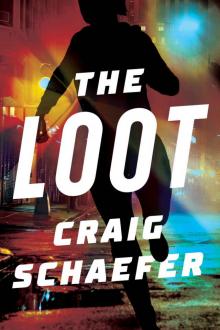 The Loot (Charlie McCabe Thriller)
The Loot (Charlie McCabe Thriller) Detonation Boulevard
Detonation Boulevard The Killing Floor Blues (Daniel Faust Book 5)
The Killing Floor Blues (Daniel Faust Book 5) Daniel Faust 03 - The Living End
Daniel Faust 03 - The Living End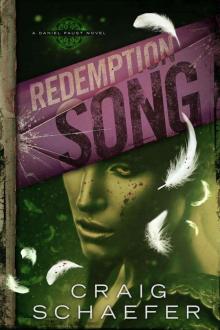 Redemption Song (Daniel Faust)
Redemption Song (Daniel Faust) Harmony Black (Harmony Black Series Book 1)
Harmony Black (Harmony Black Series Book 1) Wisdom's Grave 01 - Sworn to the Night
Wisdom's Grave 01 - Sworn to the Night Cold Spectrum
Cold Spectrum Bring the Fire (The Wisdom's Grave Trilogy Book 3)
Bring the Fire (The Wisdom's Grave Trilogy Book 3)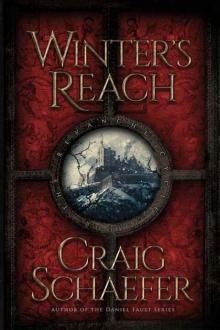 Winter's Reach (The Revanche Cycle Book 1)
Winter's Reach (The Revanche Cycle Book 1) Sworn to the Night (The Wisdom's Grave Trilogy Book 1)
Sworn to the Night (The Wisdom's Grave Trilogy Book 1) The Instruments of Control (The Revanche Cycle Book 2)
The Instruments of Control (The Revanche Cycle Book 2)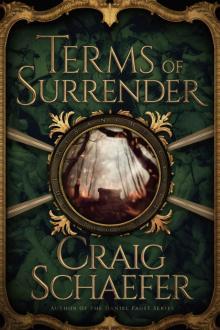 Terms of Surrender (The Revanche Cycle Book 3)
Terms of Surrender (The Revanche Cycle Book 3)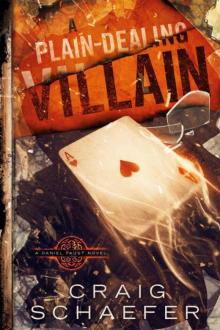 A Plain-Dealing Villain
A Plain-Dealing Villain Detonation Boulevard (The Wisdom's Grave Trilogy Book 2)
Detonation Boulevard (The Wisdom's Grave Trilogy Book 2)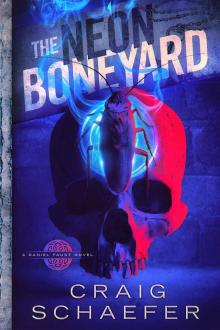 The Neon Boneyard
The Neon Boneyard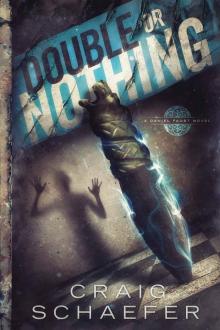 Double or Nothing (Daniel Faust Book 7)
Double or Nothing (Daniel Faust Book 7) The White Gold Score (A Daniel Faust Novella)
The White Gold Score (A Daniel Faust Novella) Sworn to the Night
Sworn to the Night